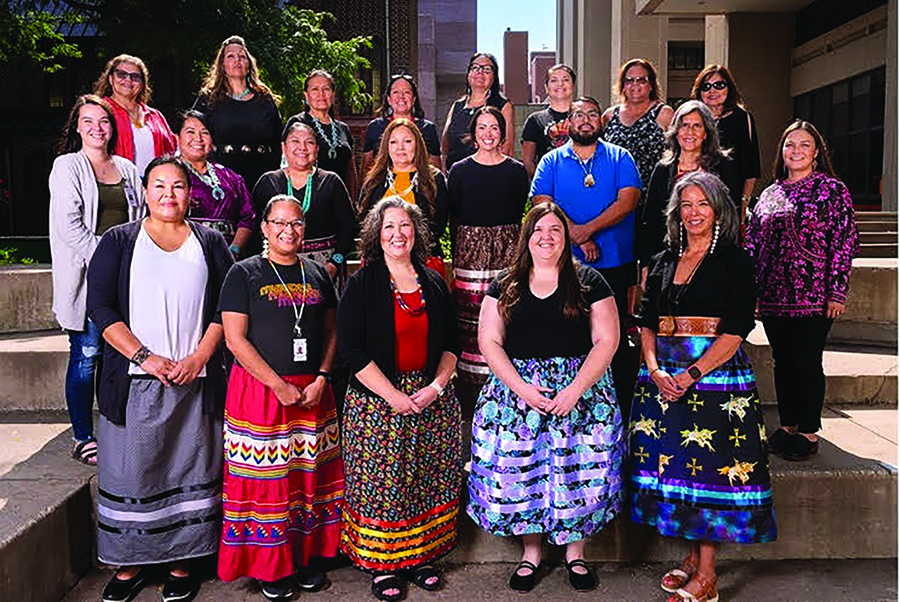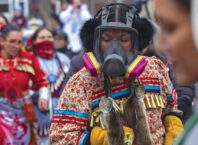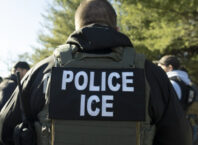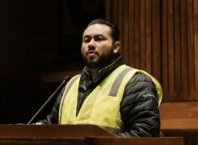
By Dan Ninham
Dr. Misty Wilkie introduced herself in a traditional way, “Boozhoo indinawemaaganidog! Misty Wilkie nindizhinikaaz zhaaganaashiimong. Makwa nindoodem. Mikinock wajiw nindoonjibaa.
“My name is Misty Wilkie, I’m bear clan, and a citizen of the Turtle Mountain Band of Chippewa Indians. I’m also a descendant of the Métis.”
Dr. Wilkie works for the University of Minnesota School of Nursing. She said, “I have three titles: Clinical Professor and I was just promoted to this title, and I’m the first American Indian Clinical Professor in the School of Nursing, Director of Doctoral Education Pathway for American Indian/Alaska Native Nurses, and Director of the Center for Indigenous People, Health and Nursing.”
She has had many firsts happen as she pursued her doctoral degree and subsequently leading others to pursue their own firsts in their medical fields and careers.
DN: What is your name, tribe, and your highest level of college, with degree/s and college institutions?
MW: My highest level of college is a PhD in nursing. I earned my associate degree in nursing from Hibbing Community College in 1997, Bachelor of Science in Nursing from Bemidji State University in 2001, Master of Science in Nursing from the University of North Dakota in 2003, and PhD in nursing from the University of Minnesota School of Nursing in 2009.
DN: What are your major career accomplishments?
MW: I’ve been involved with higher education since 2005 (and) I taught from 2005 to 2022. In 2017, I was the first in Minnesota to receive the HRSA Nursing Workforce Diversity grant. With this $2 million grant for a four-year project, Niganawenimaanaanig (Ojibwemowin for ‘we take care of them’) was established at Bemidji State University to provide social, cultural, academic, and financial support for American Indian/Alaska Native nursing students.
In 2021, an additional $2.2 million for another four years was awarded. During the eight years of funding, BSU graduated 43 American Indian/Alaska Natives with a Bachelor of Science in Nursing (BSN). The School of Nursing (SoN) Dean approached me to establish a similar program to Niganawenimaanaanig at the University of Minnesota, but for American Indian/Alaska Native nurses to earn their doctoral degree.
I accepted an adjunct position in the SoN 2021 to work with Dr. Christine Mueller on launching the Doctoral Education Pathway for American Indian/Alaska Native Nurses. In 2022, I transitioned to a full-time position, and we received a three-year grant from HRSA Nursing Workforce Diversity. We recruited and enrolled the largest cohort of AI/AN Doctor of Nursing (DNP) students in the country. During the 2024-2025 academic year, we had 19 AI/AN DNP students enrolled. Two have graduated with a DNP, and three more are set to graduate this summer.

DN: Explain how your indigenous core values influence how you lead. Share your most empowered leadership principle and how it applied to where you are and going.
MW: I try to live by the Seven Grandfather teachings. I live a good life, and I strive to be respectful to all of our relatives. I wasn’t raised in a traditional home with Ojibwe or Métis languages and ceremonies, but my earliest memories include me being drawn to our Indigenous ways of living. As an adult, I am learning our Ojibwe language. I would also be interested in learning the Michif language, but that is much more challenging for me to find resources for. I think the leadership principle I follow the most is to be a good relative. Compassion, kindness and generosity with time and talent can be transformative. One never knows how their actions or words might change someone’s life, so always be a good relative.
DN: What is a storyline that you would want the readership to know about you?
MW: I was a single mom at 18. When my son was five months old, he had a stroke. I didn’t know babies could have a stroke. My son spent two weeks in Fairview Children’s Hospital in Minneapolis. It was my first time being in a city for any period of time, and during the work week, my parents returned home to work, and I stayed with my son in the hospital. His primary nurse was the reason I became a nurse. She was kind and compassionate. I wanted to do for other families what she did for my son and me.
I started my pre-requisites for nursing school that fall. Nursing school was by far the most challenging thing I have ever done, especially as a single parent. I was very fortunate to have the support of my parents. I worked part-time while attending school full-time for the three years it took to complete my ADN, another two years for my BSN, 18 months for my MSN, and two years for PhD coursework. Once I set my mind on something, there is no stopping me.
So, I want readers to know, there is always a way to achieve your goals. You may have to sacrifice things along the way. I struggled financially for years, was on government assistance, and lived in less-than-ideal homes while I was a student, but as people say, it will be worth it. Find mentors to support you and your journey. Tell people your goals so they can hold you accountable. Surround yourself with those who can encourage you and remind you of who you are and what you’re capable of. There will be times when you want to give up, and your community of support needs to be there to cheer you on and not let you quit. We believe in you!






